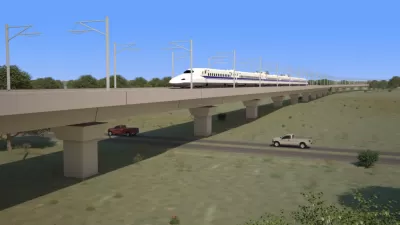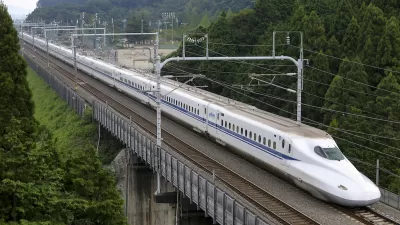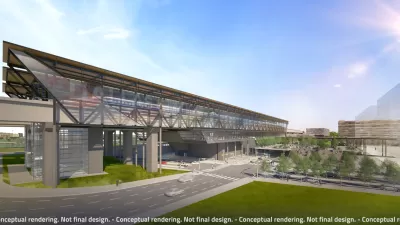A proposal for high-speed rail from Houston to Dallas is highlighting the state’s social and political divisions.

Brandon Formby reports on a proposed bullet train project that would connect Houston and Dallas. Texas Central is the private company behind the plan to build the 240-mile rail system. In addition to speeding up travel time, proponents are touting the project as a huge economic development boost for both regions.
However, opponents are concerned about the possibility of eminent domain if Texas Central starts acquiring land along the rail route. Formby says the issue is bringing to the surface a clash of ideologies in Texas state politics:
At the state Capitol, the bullet train represents the collision of two things that Republicans—who control Texas government—hold dear: private property rights and an unrestrained free market. And for two legislative sessions in a row, the free market has largely come out on top. The project has emerged relatively unscathed after bills aimed at hamstringing or killing it failed to get much traction.
Formby says this controversy is also about urban-rural tensions in the state. “The political debate is an outgrowth of a larger question confronting a state where most people now live in urban areas: How much should rural residents have to sacrifice to solve problems born in the cities they intentionally avoided or outright fled?”
The state is feeling the pressure as its transportation budget struggles to keep up with the needs of the growing populations of these metropolitan areas. While funds have largely gone into road and highway projects, the state in recent years has backed more projects by private companies, such as toll roads, and it has worked to attract the private sector.
However, Texas Central’s lead in the bullet train project has proven controversial as eminent domain looms on the horizon, says Formby:
Texas law allows railroads to use eminent domain to take land for projects. But opponents frequently argue that Texas Central doesn’t count as a railroad because it’s not currently operating any trains. Company officials counter that the $125 million they’ve already spent developing, designing, and seeking federal approval constitute operations.
Texas Central says it is conducting outreach to landowners in the proposed corridor of the rail line. “[Holly] Reed, the company executive, said they talk extensively with homeowners about how Texas Central can minimize the impacts of the project. For example, it has promised to add pass-through culverts for livestock and farm equipment in portions that will be bermed.”
Still, landowners are opposing the project and the possibility of eminent domain action. Some have refused requests to survey their properties, one landowner has sued Texas Central, and many say they have no interest in selling their land.
FULL STORY: Bullet train to the future

Maui's Vacation Rental Debate Turns Ugly
Verbal attacks, misinformation campaigns and fistfights plague a high-stakes debate to convert thousands of vacation rentals into long-term housing.

Planetizen Federal Action Tracker
A weekly monitor of how Trump’s orders and actions are impacting planners and planning in America.

Chicago’s Ghost Rails
Just beneath the surface of the modern city lie the remnants of its expansive early 20th-century streetcar system.

Bend, Oregon Zoning Reforms Prioritize Small-Scale Housing
The city altered its zoning code to allow multi-family housing and eliminated parking mandates citywide.

Amtrak Cutting Jobs, Funding to High-Speed Rail
The agency plans to cut 10 percent of its workforce and has confirmed it will not fund new high-speed rail projects.

LA Denies Basic Services to Unhoused Residents
The city has repeatedly failed to respond to requests for trash pickup at encampment sites, and eliminated a program that provided mobile showers and toilets.
Urban Design for Planners 1: Software Tools
This six-course series explores essential urban design concepts using open source software and equips planners with the tools they need to participate fully in the urban design process.
Planning for Universal Design
Learn the tools for implementing Universal Design in planning regulations.
planning NEXT
Appalachian Highlands Housing Partners
Mpact (founded as Rail~Volution)
City of Camden Redevelopment Agency
City of Astoria
City of Portland
City of Laramie





























